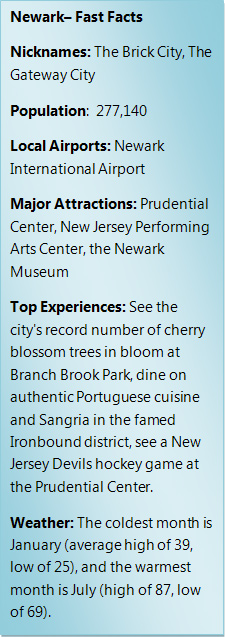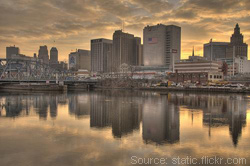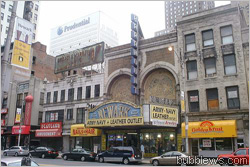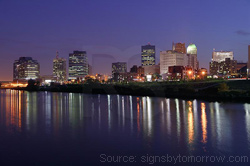 New Jersey's most populous and second-most racially-diverse city of Newark is a historic district--the third oldest city in the nation. Rich with ethnic culture, it boasts numerous museums and art galleries celebrating various heritages, performing arts centers, theatre, jazz clubs and diverse ethnic cuisine. Though the city has a poor reputation for delinquency, violence, political corruption and poverty, crime rates have been on a decline. The election of Mayor Cory Booker in 2006 inspired residents with hope that he would make good on his promises to clean up the city. During his time in office, Booker doubled the amount of affordable housing, reduced the city's deficit, took measures to lower violent crime, and made government more accessible to citizens by allowing residents to meet with him directly to voice concerns.
New Jersey's most populous and second-most racially-diverse city of Newark is a historic district--the third oldest city in the nation. Rich with ethnic culture, it boasts numerous museums and art galleries celebrating various heritages, performing arts centers, theatre, jazz clubs and diverse ethnic cuisine. Though the city has a poor reputation for delinquency, violence, political corruption and poverty, crime rates have been on a decline. The election of Mayor Cory Booker in 2006 inspired residents with hope that he would make good on his promises to clean up the city. During his time in office, Booker doubled the amount of affordable housing, reduced the city's deficit, took measures to lower violent crime, and made government more accessible to citizens by allowing residents to meet with him directly to voice concerns.
The city's convenient location may make it an attractive place to live for anyone commuting to the neighboring New York City, but there are many factors to consider before making the move. If you are considering a move to Newark, this guide will help you decide if it's the right place for you.
Newark Climate
The city, like most of New Jersey, experiences moderate weather with four distinct seasons. Summers are hot and humid, and winters are cold and damp. The city receives about three to five inches of precipitation a month, with about 30 inches of average snowfall a year. However, the amount of snow greatly varies from year to year, with some winters experiencing nearly none and others bombarded with several nor'easters.
Newark Neighborhoods
The city is divided into five wards, each made up of many distinct neighborhoods. Newark is home to people of various races and ethnic backgrounds that are concentrated in different areas. The popular Ironbound district is the city's Portuguese and Brazilian center, a large working class neighborhood full of authentic restaurants, shops and nightlife. It is known to be one of the safest neighborhoods in the city, and is home to the annual Portuguese festival in June.
 Downtown Newark is located at the bend of the Passaic River and is the city's hub for business, culture and shopping. It is home to Newark Symphony Hall, the Prudential Center, the Newark Museum, and the New Jersey Historical Society. The intersection of Market Street and Broad Street, referred to as the Four Corners, is a bustling marketplace of shops and street vendors--one of the largest in the state. Downtown is also considered one of the safer places to be in Newark, though there is limited housing there.
Downtown Newark is located at the bend of the Passaic River and is the city's hub for business, culture and shopping. It is home to Newark Symphony Hall, the Prudential Center, the Newark Museum, and the New Jersey Historical Society. The intersection of Market Street and Broad Street, referred to as the Four Corners, is a bustling marketplace of shops and street vendors--one of the largest in the state. Downtown is also considered one of the safer places to be in Newark, though there is limited housing there.
Registering Your Car
Upon arrival in New Jersey, you must update your registration within 60 days or before your out-of-state registration expires--whichever comes first. The fees for registration vary by the year and weight of the vehicle. You can see a complete list of fees at the DMV's website.
Your driver's license must also be updated within 60 days or before it expires. In the state of New Jersey, there is a six-point identification verification system, requiring you to bring a variety of documents when getting your license to prevent identity theft.
Newark Schools
 The school system in the city is operated by Newark Public Schools and is the largest in the state, serving 39,000 students in 75 facilities. The district has been funded by the state since 1995, in an attempt to improve poor performance. However, the city's students continue to exhibit low graduation rates and low test scores. Fifteen percent of Newark residents age 25 and over have not graduated high school, and 16 percent never attended at all.
The school system in the city is operated by Newark Public Schools and is the largest in the state, serving 39,000 students in 75 facilities. The district has been funded by the state since 1995, in an attempt to improve poor performance. However, the city's students continue to exhibit low graduation rates and low test scores. Fifteen percent of Newark residents age 25 and over have not graduated high school, and 16 percent never attended at all.
The city is home to several charter schools, such as two National Blue Ribbon Schools-- Robert Treat Academy Charter School and Gray Charter School, the former among the best performing in the state. The city is also home to several notable universities, including the Rutgers-Newark campus, the New Jersey Institute of Technology, Seton Hall University School of Law, and the University of Medicine and Dentistry in New Jersey.
Newark Employment
The city is the third largest insurance center in the state, after New York City and Hartford and is home to the headquarters of the company Prudential Financial. Other companies located in the city include Horizon Blue Cross and Blue Shield, IDT Corporation and New Jersey Transit. Transportation is a growing industry in the city, accounting for more than 17,000 jobs in 2011.
Unfortunately, overall employment in Newark is bleak, with an unemployment rate of 14 percent in 2010. The income per capita in Newark is a lowly $17, 367, with nearly 30 percent of its residents living below the poverty level. However, the city is just a short train ride away from New York City, making it a desirable location for commuters planning to work in Manhattan.
Newark Moving Resources
There are many moving and storage companies located in Newark that are waiting to help you relocate to your new home. Be sure to do your research and obtain estimates from several different services before choosing one for hire. You can compare online quotes from many different moving companies and other services to aid you in your move, whether you are coming from the next city or overseas. Visit the following pages here at Movers.com to get fast quotes for the following services:
Living Costs in the City
The cost of living in Newark is high--nearly 30 percent above the national average. The average cost to rent in 2009 was about $938, with the median price for purchasing a home at $348,300. While living in a safe neighborhood in Newark may be a bit costly, it is still more affordable than living in New York City.
Newark Transportation
Public transportation in Newark is extensive--the city is second behind New York in the number of households without a car. You can easily travel throughout the city as well as venture to nearby regions aboard a train or subway. Newark Penn Station is the city's major train station, located just east of downtown. It connects the city's PATH system (which connects Newark to Manhattan) with three New Jersey Transit commuter rail lines and Amtrak trains to Philadelphia and Washington, DC. The Newark Broad Street Station is located one mile north and is served by two commuter rail lines. The two stations are connected by Newark's Light Rail system, which also runs from Penn Station to the city's northern communities, as well as nearby towns of Belleville and Bloomfield. The city's third train station, the Newark Liberty International Airport station, connects the Northeast Corridor and North Jersey Coast Line to the airport via AirTrain Newark, a three mile monorail system.
Bus service in Newark is provided by New Jersey Transit and CoachUSA.
Culture and Contemporary Life
 One of the oldest cities in the country, Newark is steeped in history and rich with diverse ethnic culture. Preserved colonial, gothic, Art Deco and French Renaissance architecture, restored Victorian homes on James Street and the memorable Military Park are just some of the relics that give the city its historic charm.
One of the oldest cities in the country, Newark is steeped in history and rich with diverse ethnic culture. Preserved colonial, gothic, Art Deco and French Renaissance architecture, restored Victorian homes on James Street and the memorable Military Park are just some of the relics that give the city its historic charm.
Boasting residents from an array of cultural backgrounds, the city celebrates history and artistic contributions from all walks of life. The Newark Museum is the state's largest and features an assortment of ethnic collections, including Indian, Tibetan and African articles and hosts a multitude of heritage festivals. The Halsey Street Gallery celebrates African-American artists, and the Jewish Museum of New Jersey honors the culture of the Jewish people. The Ironbound District is infused with Portuguese and Latin American culture, boasting some of the most renowned Portuguese/Brazilian cuisine in the region.
There are various festivals in the city, including the Portugal Day Festival in the Ironbound, the Newark Black Film Festival, the Lincoln Park Music Festival and McDonald's Gospelfest. The Cherry Blossom Festival celebrates Newark's collection of 4,300 cherry blossom trees in Branch Brook Park --the oldest county park in the nation.
Newark Relocation Tips
-
Research the neighborhoods thoroughly before you pick a place to relocate. Many parts of the city have very high rates of crime and are not safe to visit or live. Some of the safest neighborhoods in Newark include the Ironbound district and Forest Hill.
-
Bring a diverse wardrobe. New Jersey has a temperate seasonal climate, which means four varied seasons with a wide range of temperatures.
-
Newark has an extensive transportation system and parking is often difficult. If you own a car, you may want to reconsider bringing it with you. Look into the parking options near your new home before deciding.